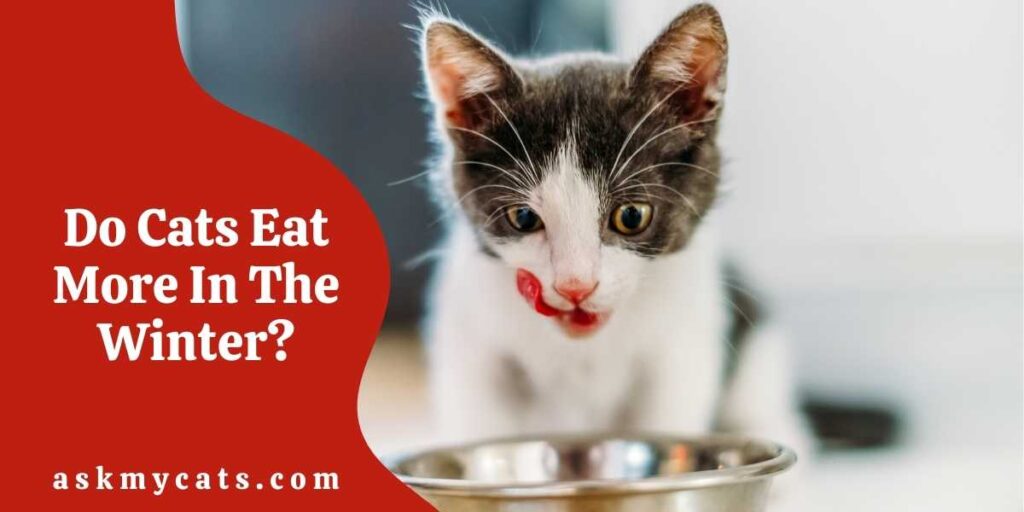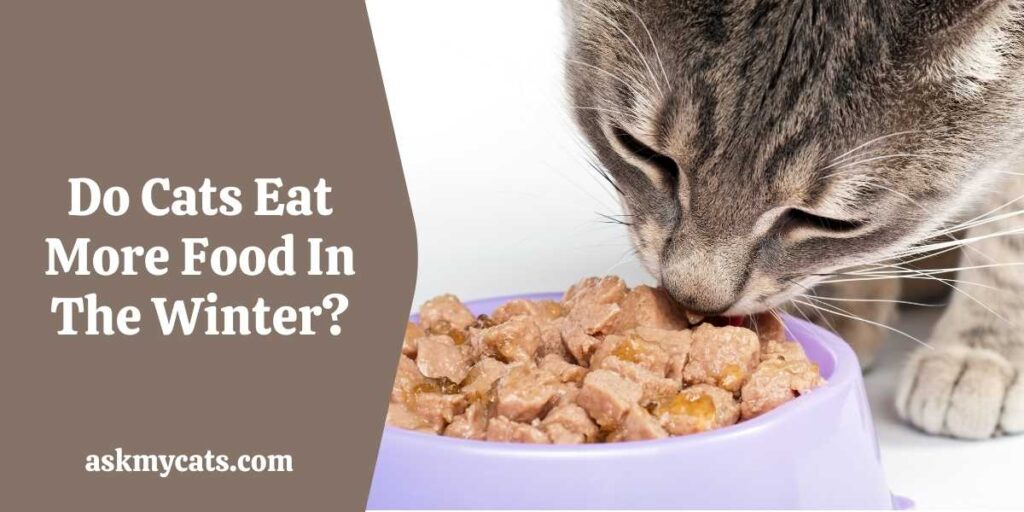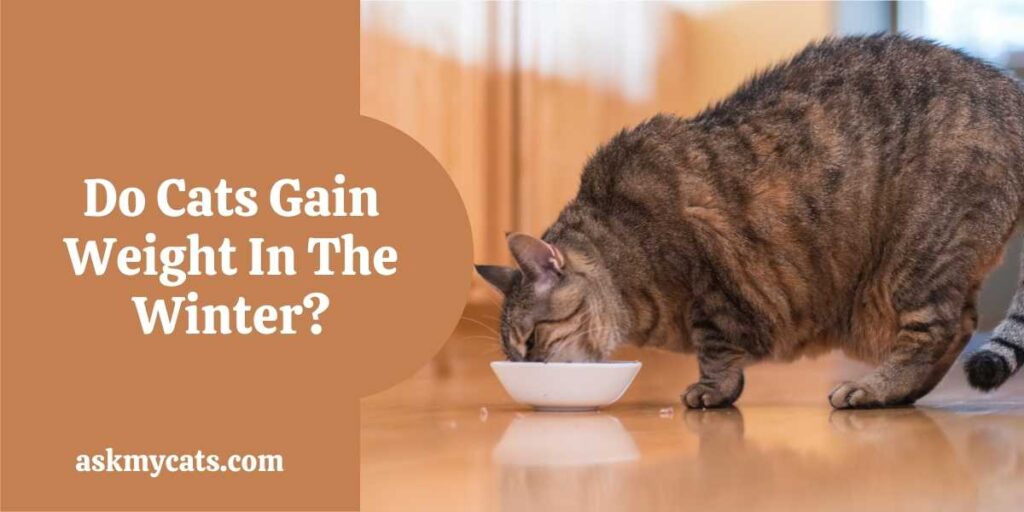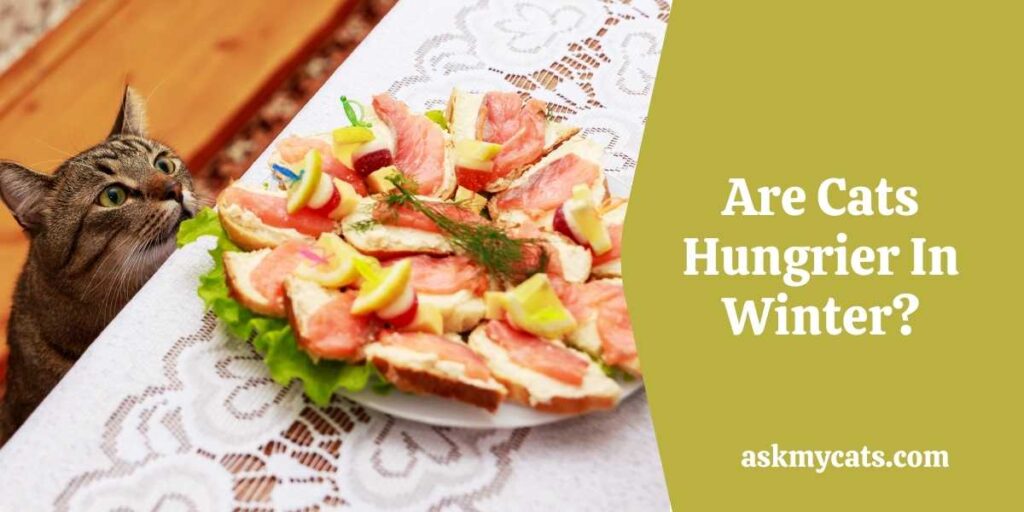Outdoor cats have a higher hunger in the winter, and they expend calories faster. This is a natural approach for cats to keep their core body temperature at a comfortable level.
This biological process appears to be superfluous for an indoor cat raised in a warm and pleasant environment. You’d think your cat wouldn’t be much hungry.
A four-year observational study of 38 adult colony cats indicated that cats consume more during the winter and that owners should feed their pets more food during this period.
When it’s chilly outside, cats, like many humans, are more prone to comfort eat, but in their case, it’s likely due to the additional energy they require to stay warm when out and about.


Give Your Cat the Perfect Day
Get the Free Ebook!
Do Cats Eat More Food In The Winter?
Yes, cats will eat more food in the winter.

You are not alone if you find your cat being more hungry during the cold months.
During the winter months, all cats suffer a sudden surge in hunger. This response to snow, ice, and rain allows them to adjust to seasonal variations and changes in their metabolic requirements.
In four-year research published in PLoS One, 38 cats in a facility in southern France were tracked.
- From June to August, cats ate less food during the summer months.
- During the winter, from October to February, cats ate the most.
- They ate somewhere in the center in the spring and early fall.
- During the summer, cats ate roughly 15% less food than they did in the winter.
Cats use more energy in the winter to keep their core body temperature warm. Of course, food consumption provides calories. Thus, a cat’s hunger grows.
Must Read: How Cold Can Cats Survive Outside?
Do Cats Gain Weight In The Winter?
No, cats will not gain weight even after eating more food in winter.

Hibernation is reserved for animals who actively store fat during hard times. This category does not include domesticated or wild cats.
Cats fall into torpor rather than shutting down their body for lengthy periods to preserve energy.
Torpor is a sort of hibernation. Non-hibernating animals, on the other hand, have a significantly shorter period of inactivity. It’s a way for wild cats to withstand really hard weather for only a day or two.
To continue eating, wild cats in torpor will awaken. Hibernating animals will continue to slumber.
On the other hand, domestic cats have all of their food and living needs to be fulfilled by humans. As a result, they will not need to hibernate or put on weight in preparation for the winter.
During the winter months, though, you may notice your catnapping more. Your cat is tired due to the cooler weather and fewer daylight hours. The cat’s extended slumber might be attributed to metabolic changes, but it will not result in hibernation.
Domestication, of course, brings new elements that might cause cats to gain weight.
Indoor cats, for example, gain weight in the winter because their owners are unaware of their cats’ increased hunger. Your cat isn’t gaining weight in preparation for hibernation; it’s just confusing and eating more than its body requires to survive.
When the weather becomes colder, many animals increase the frequency and amount of their meals.
According to the Canadian Journal of Animal Science, lactating cows modified their nutrition and milk output amid colder temperatures.
Cows would produce less milk per calorie when the temperature dropped, especially their output in warmer weather.
Dairy farmers adjusted for this by giving their cows additional food during the winter months, in addition to insulating their enclosures or providing more heat.
When it’s chilly outdoors, even humans become hungrier. You would believe it’s because of the cold, but it’s a survival strategy. To stay warm, your body requires extra energy.
This habit is typical and anticipated if you find your cat eating extra food in the winter. On the other hand, indoor cats do not require more food throughout the winter.
Interesting Read: What To Feed Feral Cats In Winter?
Are Cats Hungrier In Winter?
Yes, cats will become hungrier in the winter season.

It’s critical to comprehend how cats recognize the arrival of winter. Due to temperature variations and the amount of sunshine available, cats will eat more than usual.
Many animals use the length of sunshine to detect which season is coming. Cats will recognize that they need to eat more food the same way those birds recognize the need to migrate, and some reptiles recognize the need to burrow for warmth.
While your cat will respond to variations in temperature, it will also gaze out the window to determine the season. Indoor cats that dwell in warm environments experience a shift in metabolism.
Your cat’s appetite will be increased even if your house is kept at 80 degrees Fahrenheit all year. There’s no way to avoid this natural shift completely.
How Much More Do Cats Eat In Winter?
The Royal Canine Research Centre and the University of Liverpool’s School of Veterinary Science did a study on cats’ feeding patterns and discovered that cats’ appetites rose by as much as 15% during the colder winter months.
We can state that certain cats don’t require extra food during the winter since we understand how the seasons affect their metabolism. Cats only need to burn more calories when it’s chilly outside.
Increasing the amount of food consumed throughout the winter is one way to raise the cat’s internal temperature. However, if the cat stays indoors in a warm environment, its body temperature will remain stable.
Nonetheless, when the light changes, and it feels like winter has arrived, your cat may become hungry. Your cat’s body will be perplexed as to why “winter” does not imply “cold.” Its instincts are unaffected by the introduction of radiators.
Your cat will continue to try to save calories from surviving the winter months. The cat won’t use these additional calories; therefore, they’ll be stored as fat.
You might like to read about Do Cats Get A Winter Coat?
Do Indoor Cats Eat More In The Winter?
When it’s cold outdoors, even indoor cats feel tempted to eat more.
Temperature fluctuations and sunshine exposure help cats detect the start of winter. Shorter days and longer nights will convince your cat that winter is approaching. Your cat will instinctively become hungrier, begging for more food and goodies.
You should not just provide additional food to your indoor cat. Because the temperature in your home is controlled, your cat will not need to elevate its body temperature.
The many impulses will confuse your cat’s physiology, causing it to desire to consume more calories than it can burn. Eating extra food will, of course, result in weight increase, mobility challenges, and health issues.
If your home is maintained warm, indoor cats don’t need to eat more. On the other hand, outdoor cats require more energy to expend due to the cold.
Even if a cat stays inside, it will sense the need for additional food throughout the winter. On an intuitive level, cats adapt to their surroundings and prepare for the changing seasons.
Cats associate a decrease in the sunshine with the arrival of winter. To prepare for the impending dip in temperature, your cat will start eating extra food.
This temperature decrease never occurs in your heated living environment. Your cat, on the other hand, will not comprehend.
It will still feel compelled to consume larger and more frequent meals than usual. You shouldn’t provide extra meals to indoor cats since they don’t require more calories.
Outdoor cats are affected by the weather, and they will require extra food to stay warm and healthy. If your cat goes outside, you’ll need to provide additional food.
Because your cat will not be wasting as much energy indoors, you will not need to feed it as frequently. Some cats may choose to spend more time indoors. They prefer to cozy up near a heater and sleep in the cooler weather.
The personality of your cat determines this. Cats accustomed to going outside may like to continue doing so simply out of habit. When a cat is abruptly confined to a house after being used to larger surroundings, it may become restless, angry, and agitated.
Interesting Read: Do Cats Get Cold In The Winter?
Does Weather Affect Cats Appetite?
The weather has an effect on the cat’s appetite.
According to new research, most cats will consume 15% less during the summer months, even mostly indoor cats. In the summer, it is thought that cats expend less energy to regulate their body temperature and hence require less food.
Seasonal fluctuations in sunshine and temperature cause major hormonal changes in mammals, affecting their metabolism and impacting the quantity of food they consume.
What To Feed Cats In Cold Weather?
It is possible to feed your cats canned or dry food in cold weather.
While dry food does not freeze in extreme cold, canned food freezes because of its high moisture content. If you wish to provide canned food to your outdoor cats, use insulated bowls and feed them regularly.
Interesting Read: Do Cats Shed More In Winter?
Frequently Asked Questions
Do cats sleep more and eat less in winter?
They may sleep even longer than normal during the winter months due to lower daylight hours or changes in your pattern, such as an earlier bedtime. You don’t have to be concerned about lengthy cat naps during the winter. There may be more going on than additional winter sleep.
Do cats burn more calories in the cold?
It’s also crucial to remember that in the winter, cats burn more calories to remain warm, so feeding them a little more than in the summer can assist them in avoiding losing weight.
Why do cats look larger on cold days?
Cats must physically acclimatize to the shift in temperature by growing a thicker coat and increasing their weather resistance. In the winter, cats that spend a lot of time outside require extra food since keeping warm depletes energy.
Final Words
Cold weather raises a cat’s energy requirements, according to the ASPCA. The more energy it takes for the cat’s body to maintain its proper temperature as the temperature drops, the more energy it requires.
As a result, cats require more food in colder weather than in warmer or hotter weather.
Ask your questions in the comments section below.
You might also like to read:
- Do Cats Need Winter Clothing?
- Can I Walk My Cat In Winter/Snow?
- Can I Bathe My Cat In Winter?
- Do Cats Get Dandruff In Winter?
- Do Cats Go Into Heat In The Winter?
- Do Cats Have Kittens In Winter?
- Do Cats Drink Less Water In The Winter?
- Can Cats Live In A Garage In The Winter?
- How To Keep A Stray Cat Warm Outside In Winter?
- How To Keep Indoor Cats Warm In Winter?
- How Do Stray Cats Survive Winter?
- Can Cats Get Ticks In The Winter?
- Do Cats Really Like Snow?
- How to Bury a Cat During the Winter?
- Lost Cat in Winter? Here’s How to Find Them
- Can Cats Get Fleas In The Winter?
- How To Keep Cats Warm Without Electricity?
